Features of profiles for sliding wardrobes

Sliding wardrobes have become an integral part of the modern interior. They allow you to rationally use the living space, store a wide variety of items without cluttering the room with them. In addition, with their help, it is easy to create a unique look for an apartment or house through an individual design solution. Modern materials - mirrors, glass, chipboards, solid wood and many others need an appropriate frame. To avoid all the difficulties, turn to steel or aluminum profiles.
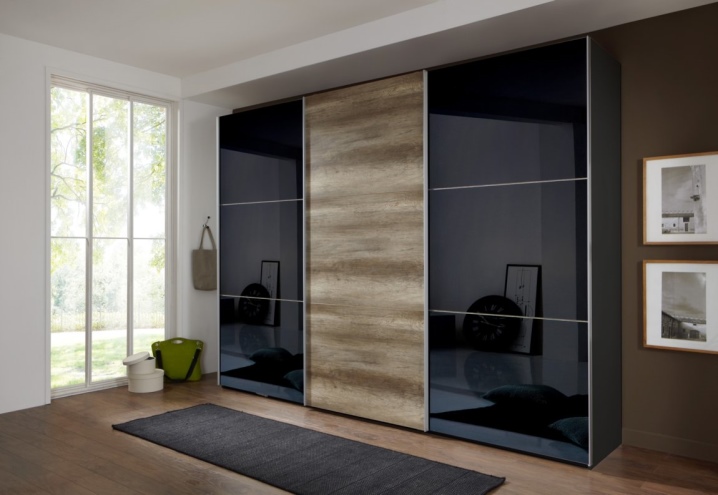
Description
To understand the work of a metal profile in wardrobes, it is useful to have an idea of the types of sliding doors. Among them, the following designs stand out:
- doors with low-support roller mechanisms;
- top-hung doors for sliding wardrobes;
- frameless sliding sliding doors;
- hinged doors;
- beveled sliding doors.
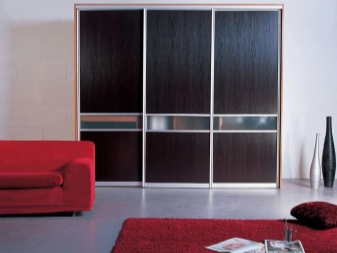
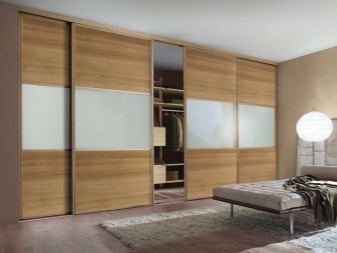
Doors with low support roller mechanisms
This system is several door leaves (usually two), framed by a metal profile, located vertically and horizontally (above and below). The door is moved along the lower and upper guides by means of two lower rollers.
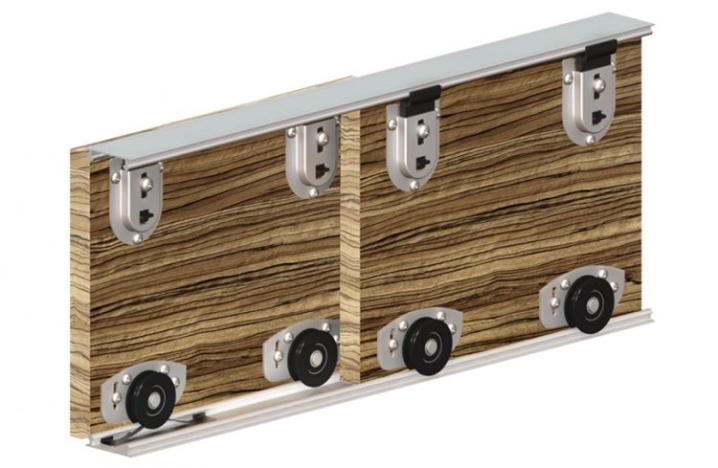
Top-hung doors for sliding wardrobes
Suspension systems are often used along with lower support systems. They are used not only in wardrobes, but also as doors inside apartments between rooms. Unlike the first case, the number of canvases should be no more than two, since in order to prevent loosening of the canvases, stationary roller devices are used here.
However, when using roller connectors, it is possible to install more hanging doors.
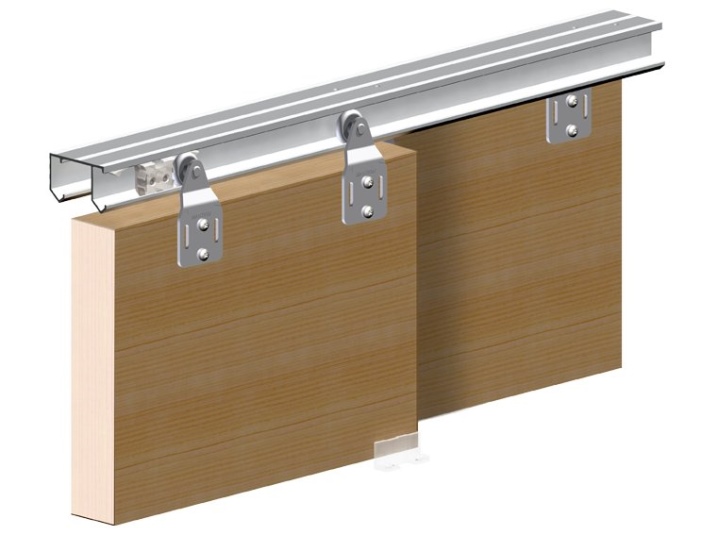
Frameless sliding doors
In cases where the presence of metal profiles as a contour is not provided, it is recommended to use both structures with lower supports and suspended frameless doors made, depending on the designer's intention, from MDF, solid wood and other materials.
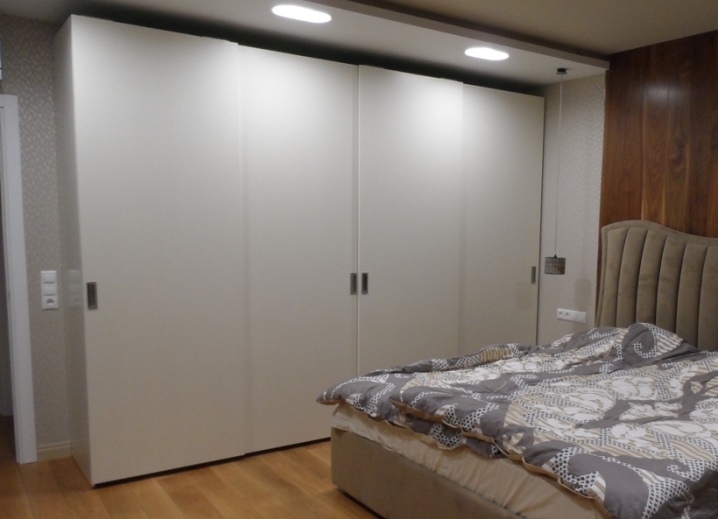
Hinged doors
There are several varieties of these products that have some features (FLUA Standard, Premium, Coplanar, etc.), all types are united by the fact that rollers and guides are installed hidden behind the canvases, since they are located in niches adapted for this. Doors Standart equipped with vertical profiles, Premium have a frame structure, door leaves Coplanar open along arc guides so that one door moves in front of the other.
Such systems consist of only two canvases.
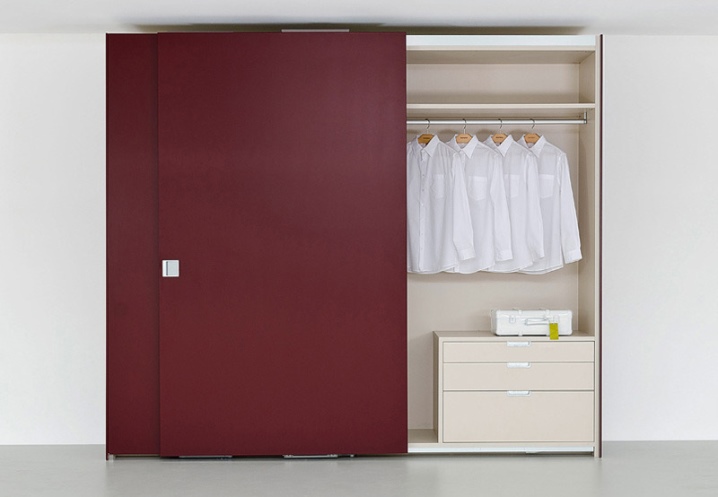
Sliding doors with bevel
Recently, sliding wardrobes located in the attic, in the attic or in another room with a sloped ceiling are often used. For this, there is a special design, in which the bevel of the upper edge at the door is provided. The metal profile does the same job as in the rest of the cases.
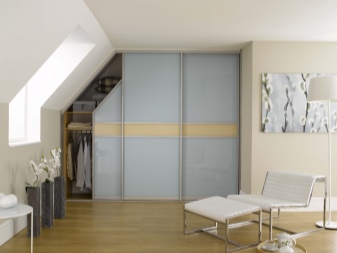
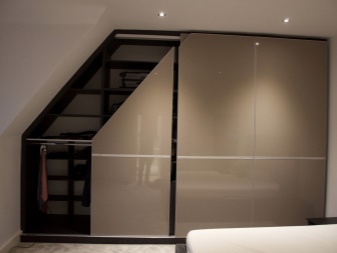
Profile types overview
The profiles used for the installation of sliding wardrobes differ not only in the variety of shapes, but also in sizes. As a rule, the profiles of the "H" and "C" form are used as the main ones. The C-shaped asymmetric profile can simultaneously serve as a guide and a handle, therefore, vertical structural elements of the wardrobe are made of it.
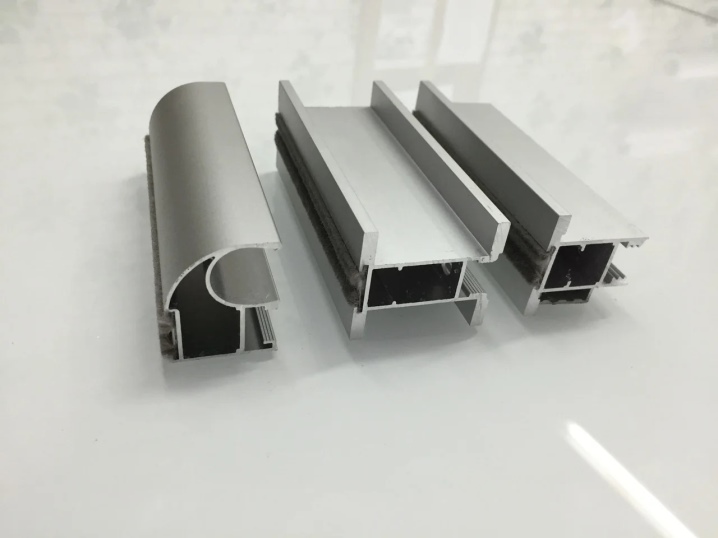
U-shaped is used for the upper guides. Fusion is suitable for joining door leaf angled from 14 to 135. Nova is an inconspicuous thin profile with a visible part of 5 mm, specially created for the thickness of the most popular 16 mm board. It is well suited for a door leaf with a width of 1.5 meters and a length of 2.6 m. There are also O and Flat profiles. There are also profiles of the MS system, designed for assembling components so that all single structural elements are on the same level.
These slim profiles are 11 mm wide and are in line with the latest minimalist design trends.
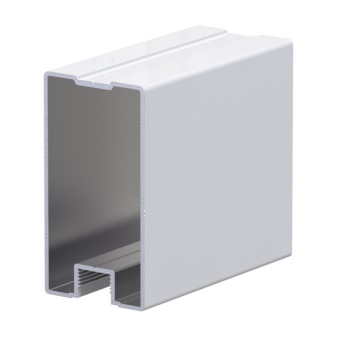
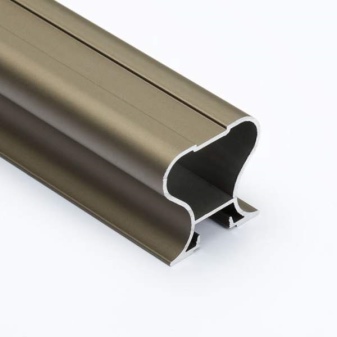
In the past few years, manufacturers have been offering radius wardrobes, which have a number of advantages: with their help, the space is rationally used, the usable area of the room is preserved, the room is reasonably zoned, and flaws in the planning of housing are effectively corrected. However, without an appropriate profile, installation of such a structure is impossible. On special bending machines, aluminum profiles with high ductility are adjusted to the required shape, which allows for an individual solution.
Their sizes range from 200 mm to 6000 mm.
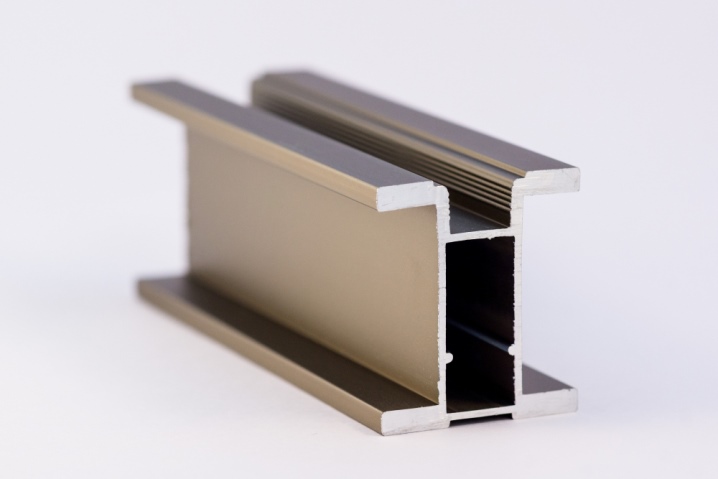
At the place of application
At the place of application, four types of profiles are distinguished:
- vertical;
- guide;
- separating;
- horizontal.
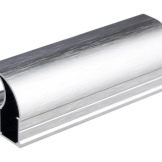
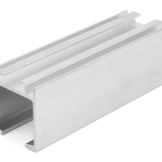
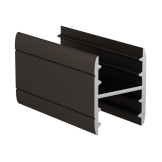
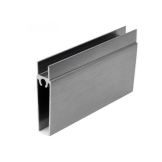
Among the vertical structures, there are hidden and open types, expanded, and also H-shaped. Depending on the proposed design solution, there is a choice of profile style.
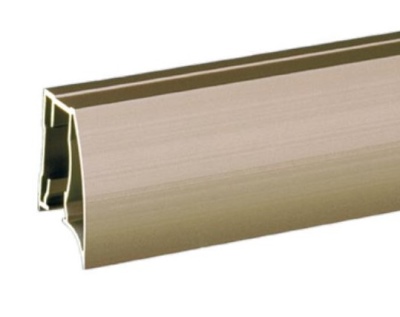
The main function of the guide profiles is to secure the roller mechanism. These products are produced in various versions: with one or more sections, for top or bottom positioning, etc.
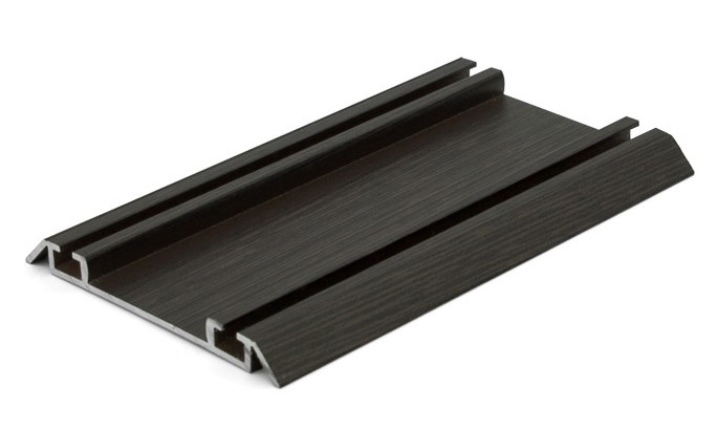
The purpose of the dividing profile speaks for itself - it is used when combining inserts made of different materials when assembling the door leaf.
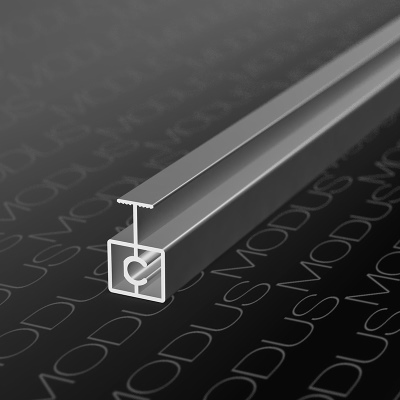
The horizontal profile solves two problems: maintaining the guide at a given level and performing the function of support. These profiles can be: top and bottom type, double or single.
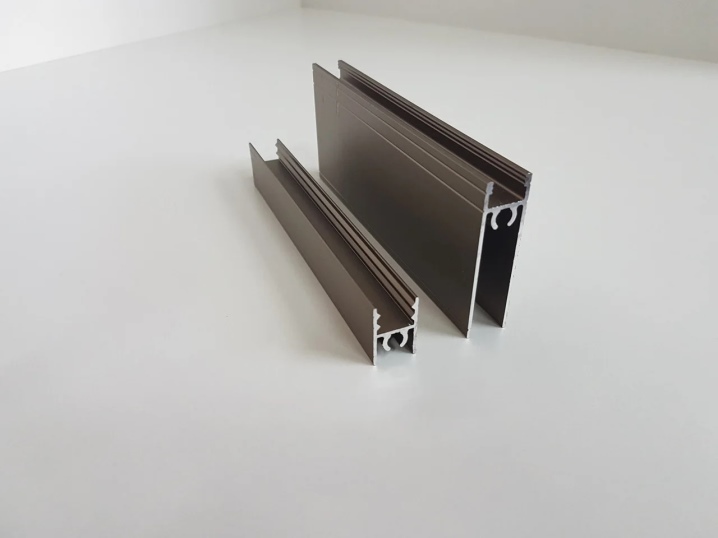
By material
At the moment, in the manufacture of sliding wardrobes, two types of metal profiles are used - steel and aluminum. The first belongs to the economy class, the second - to the luxury class. For the manufacture of steel structures, stainless steel is used, this is a good option, but when ordering such a product, it is necessary to keep in mind the limitation - the height of the door should not exceed 3 meters, otherwise it will inevitably lose its rigidity.
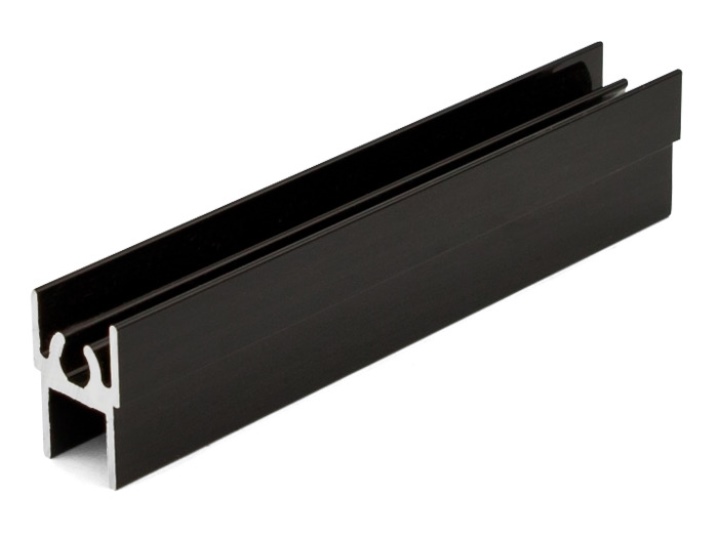
The term "aluminum" often means aluminum alloys of various qualities, which do not always have high mechanical properties and aesthetic appearance. However, in this case, we mean the AD31 alloy, melted in accordance with GOST 4784-97 (according to the US standard, this alloy is marked 6060), which provides the profile not only with an attractive appearance, but also a much higher strength and wear resistance compared to common duralumin and silumin ...
An important point is that for the smelting of this alloy, instead of scrap metal containing undesirable impurities, primary aluminum is used as a raw material.
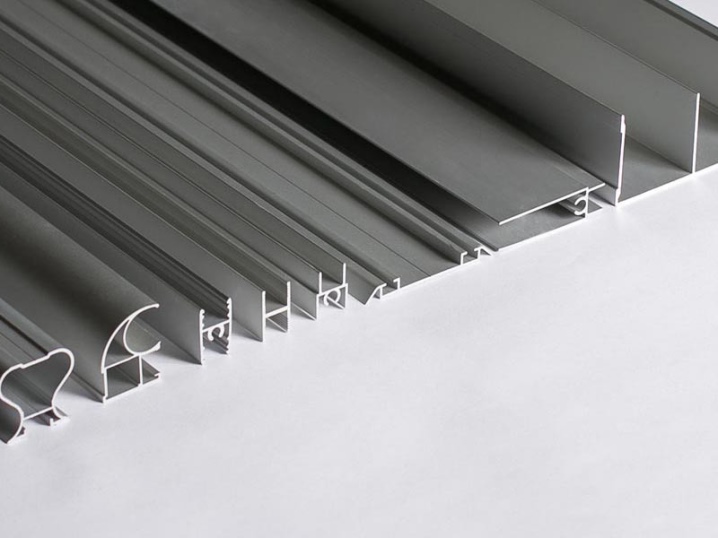
The alloy AD31 includes:
- silicon - 0.20 - 0.6%;
- iron - 0.5%;
- copper - 0.1%;
- manganese - 0.1%;
- magnesium - 0.45 - 0.9%;
- chromium - 0.1%;
- zinc - 0.20%;
- titanium - 0.15%;
- aluminum is the base.
The rigidity and strength of the aluminum structure is provided by the physical and mechanical properties of the AD31 alloy - the tensile strength is 160-175 MPa, the relative elongation is 7%. The strength characteristic significantly depends on the thickness of the material - thin profiles are inferior to thicker ones by about 10-15%, therefore the profile thickness is the main difference between a quality product.
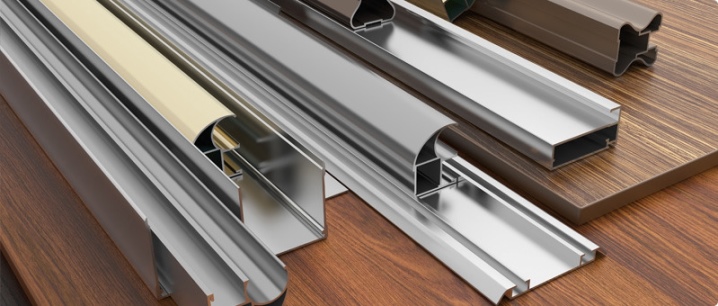
Profiles are produced by extrusion (from the English.extrusion - "extrusion"), the essence of which is as follows: under the influence of high temperature, the material goes into a softened state, then it is pushed with force through the die - a specially perforated form with holes made of high-strength alloy. Thereafter, the profile of the desired configuration is cooled.
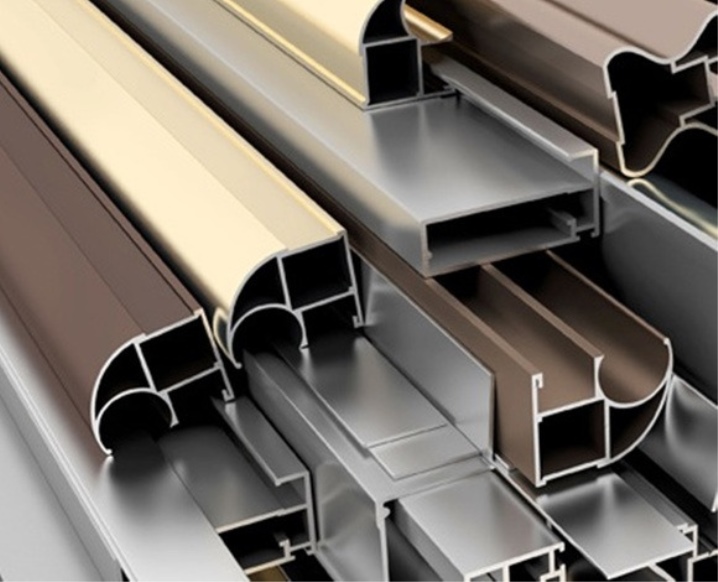
Methods of staining and color solutions
Among the many advantages of aluminum profiles, one of the most significant is the ability to fit it into almost any interior. In addition to the natural grayish tint, decorative coatings can be applied to it with the help of powder paint or polyvinyl chloride (PVC) coating, for example, imitating gold, "gold brush", silver (shiny or matte), as well as having shades of "champagne" (a kind of beige colors), “gun”, “black brush”, “sonoma oak” (imitates wood of a pinkish-gray shade with old stains), which can be light or dark.
Combinations of several colors are interesting: with white, black, etc. PVC lamination ("wrapping"), in addition to the decorative function, protects the profile from corrosion, scratches and minor damages.
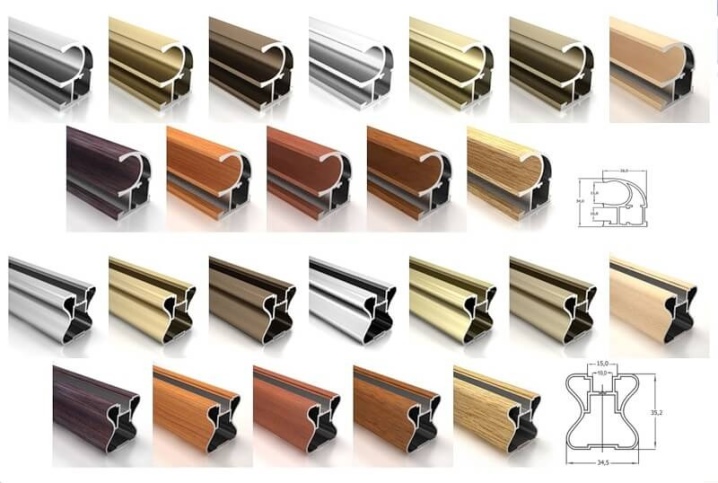
Anodized profile takes a special place. Anodizing is the application of a protective oxide film by the electrolytic method in a sulfuric acid solution. This protective coating turns out to be colorless, rather loose and porous, which makes it easy to paint it using various technologies that create a variety of effects. A feature of the anodized profile is the durability and strength of its surface.
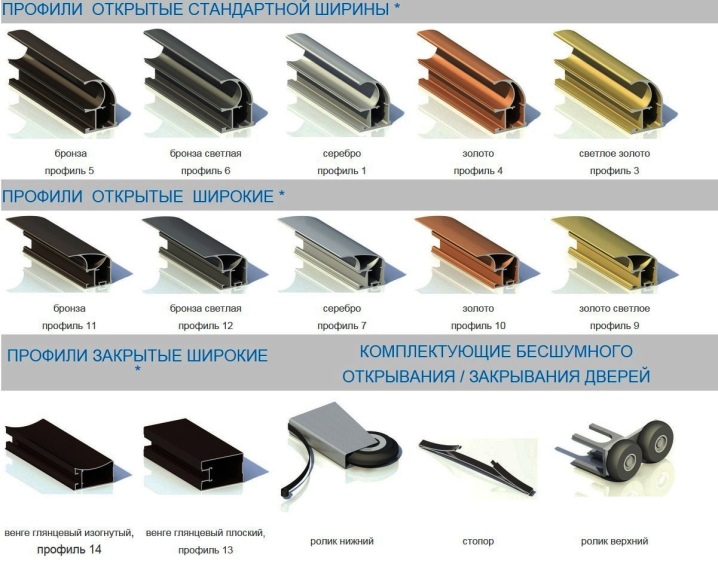
Popular manufacturers
At the moment, there are many manufacturers of aluminum profiles on the market. Doksal and Slim profiles are especially popular among consumers. Doksal profiles are distinguished not only by their reliability, but also by the variety of product appearance. All types of coatings are used here: PVC wrapping, painting, anodizing. An important point is their durability - even sunlight does not harm bright colors.
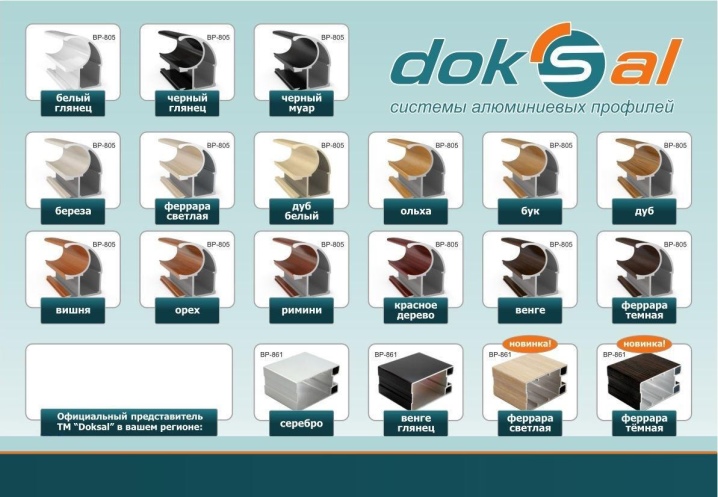
Special Feature Slim – brevity... These are fashionable narrow profiles, made in two colors - "silver" and "Matt black", which allow you to expand the space of the living space with mirrors, without overloading it with wide lintels.
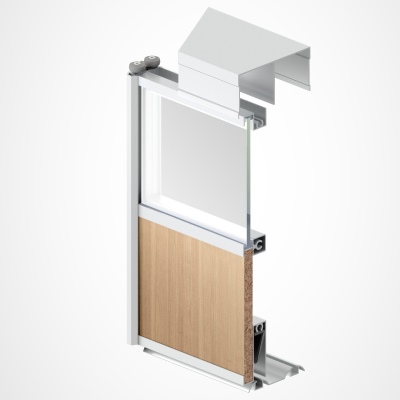
Criterias of choice
The abundance of domestic and foreign manufacturers of profiles for sliding-door wardrobes can baffle the consumer. When asked which profile should be preferred: aluminum or steel, the answer is obvious - aluminum is better in all basic parameters. Many well-known European companies that produce profiles do not put the entire range of products on the Russian market, because, although their products are of good quality, the high cost does not attract our customers.
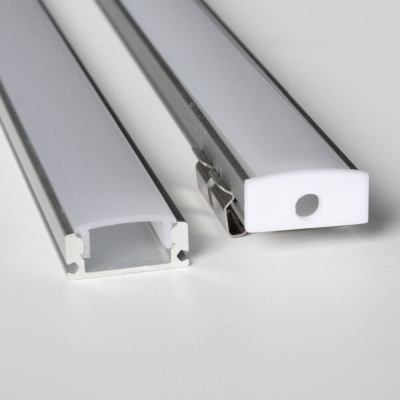
Domestic manufacturers present a much wider color gamut, which allows for bold design decisions, and have a relatively low price, but the quality of coatings in some cases leaves much to be desired. Choosing an aluminum profile for a wardrobe, you need to balance the financial capabilities and the quality of the purchased product.
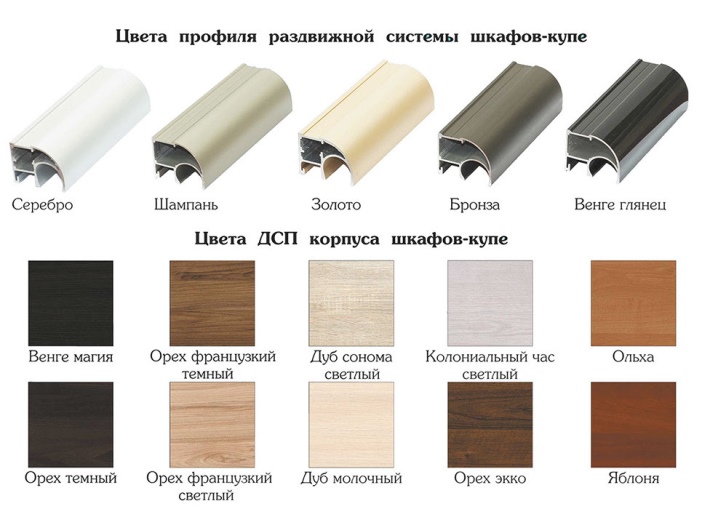













The comment was sent successfully.